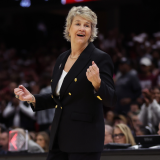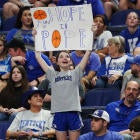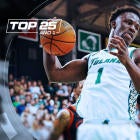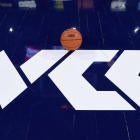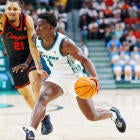It is the longshot of longshots. A 16 seed, as you probably know, has never beaten a 1 seed. It isn’t David and Goliath, since David won. It’s Goliath and whoever he killed just before David.
Still, hope springs eternal, and there are plenty of reasons to believe it will happen someday -- there’s Princeton’s 50-49 loss to Georgetown thanks to an Alonzo Mourning block of Kit Mueller in the dying seconds back in 1989, or Popeye Jones’ Murray State taking Michigan State to overtime in 1990. Is this the year we replace “a sixteen seed” in the lexicon with a team forever immortalized? Well, probably not, but here are your reasons for hope.
UC Davis, 16 seed, Midwest Region: The Aggies earned a date with Kansas by virtue of defeating North Carolina Central 67-63 on Wednesday night. They didn’t exactly telegraph a performance for the ages, but there are reasons we are still watching them in March. They own the 55th-best defense in the country, per DRating, and they get to the foul line quite a bit -- 35th-most in the country. Their top two players in minutes played this year, Brynton Lemar and Darius Graham, each shoot better than 38 percent from deep.
Some areas of concern: they really don’t score well, checking in at 272nd in ORating, and once they get to the foul line, they shoot only 66.5 percent. And their turnover total checked in at 29th in the country, problematic against a Kansas team that takes advantage of every offensive possession it gets.
Mount St. Mary’s, 16 seed, East Region: Here by virtue of a narrow victory against New Orleans, Mount St. Mary’s is no stranger to a difficult schedule. Back in November, the Mountaineers played consecutive road games at West Virginia, Iowa State, Minnesota, George Mason, Southern Illinois, Texas-Arlington, Michigan and Arkansas. That’s six tournament opponents in about three weeks, without a break or a trip home. So Jamion Christian’s crew is battle-tested, and Junior Robinson showed the country on Tuesday that he can score against anyone. The Mount deploys four regulars who shoot 36 percent or better from beyond the arc. They turn people over well, with an opponent’s turnover percentage of 18.7 percent, testament to how well Christian learned from his time assisting Shaka Smart at VCU (fun fact: Will Wade’s VCU had the identical mark this season).
Areas of concern? Overall offensive production, even so, rates 276th in the country. They are small, and they get killed on the glass, especially offensive rebounding. They turn the ball over way too often themselves. All those extra possessions against the fifth-best offense in the country seem like they’re going to be a problem.
South Dakota State, 16 seed, West Region: The Jackrabbits, who ironically play at the 209th-fastest pace in the country, get first crack at Gonzaga. There are good numbers here for the Summit League champs if you are hoping for an upset -- 20th in the country in 3-point makes and 12th in attempts, 10th in free-throw accuracy, and an approach that limits how often opponents get to the line. Mike Daum, a burly 6-foot-9 forward, averaged 25.3 points -- he’s a tough matchup for anyone.
However, that hands-off approach on the defensive end allowed opponents free rein to conduct their offense as they saw fit. The Jackrabbits finished 330th in DRating, and were last in the entire country in both 3-point attempts and 3-point makes allowed. They’ll need to outscore Gonzaga, and ... well, Gonzaga finished second in the country in ORating this season. And also first in DRating. It’s not ideal.
Texas Southern, 16 seed, South Region: Very few 16 seeds have a coach with a Final Four pedigree, but the Tigers do in Mike Davis, who took Indiana there back in 2001-02. Still, Jared Jeffries and Dane Fife aren’t walking through that door. Davis does have a deep team, with balanced scoring (five players average at least 8.5 points per game) and both regular-season and tournament crowns from the SWAC. They get to the line as often as virtually anyone -- third in the nation in attempts. And they turn opponents over often, with 244 steals, 39th in the country.
They don’t really do many of the things you would want from a potential upset pick, though. They shoot 29.7 percent from deep, 339th of 351 in the country. Their team rebounding percentage of 48.9 percent ranks 257th in the country. That’s a problem generally, but in this matchup, against North Carolina? Well, the Tar Heels finished the season grabbing 58.5 percent of available rebounds, which is 256 slots ahead of the Tigers.
Bottom line: Don’t bet the house on any of these teams. Then again, the underlying metrics probably didn’t give David much of a shot, either.







